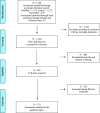European Psychiatric Association guidance on treatment of cognitive impairment in schizophrenia
- PMID: 36059103
- PMCID: PMC9532218
- DOI: 10.1192/j.eurpsy.2022.2315
European Psychiatric Association guidance on treatment of cognitive impairment in schizophrenia
Abstract
Background: Although cognitive impairment is a core symptom of schizophrenia related to poorer outcomes in different functional domains, it still remains a major therapeutic challenge. To date, no comprehensive treatment guidelines for cognitive impairment in schizophrenia are implemented.
Methods: The aim of the present guidance paper is to provide a comprehensive meta-review of the current available evidence-based treatments for cognitive impairment in schizophrenia. The guidance is structured into three sections: pharmacological treatment, psychosocial interventions, and somatic treatments.
Results: Based on the reviewed evidence, this European Psychiatric Association guidance recommends an appropriate pharmacological management as a fundamental starting point in the treatment of cognitive impairment in schizophrenia. In particular, second-generation antipsychotics are recommended for their favorable cognitive profile compared to first-generation antipsychotics, although no clear superiority of a single second-generation antipsychotic has currently been found. Anticholinergic and benzodiazepine burdens should be kept to a minimum, considering the negative impact on cognitive functioning. Among psychosocial interventions, cognitive remediation and physical exercise are recommended for the treatment of cognitive impairment in schizophrenia. Noninvasive brain stimulation techniques could be taken into account as add-on therapy.
Conclusions: Overall, there is definitive progress in the field, but further research is needed to develop specific treatments for cognitive impairment in schizophrenia. The dissemination of this guidance paper may promote the development of shared guidelines concerning the treatment of cognitive functions in schizophrenia, with the purpose to improve the quality of care and to achieve recovery in this population.
Keywords: Cognitive enhancement; cognitive functioning; cognitive remediation; evidence-based; systematic review.
References
-
- Bleuler E. Dementia praecox, or the group of schizophrenias. New York: International Universities Press; 1969.
-
- Kraepelin E. Dementia praecox and paraphrenia, together with manic-depressive insanity and paranoia. Special edition. Birmingham, AL: Classics of Medicine; 1989.
Publication types
MeSH terms
Substances
LinkOut - more resources
Full Text Sources
Medical


